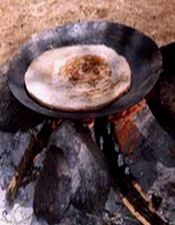 |
UNLEAVENED BREAD
The unleavened |
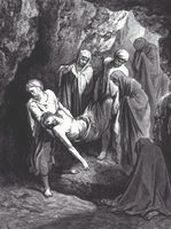 |
|
Isaiah's Prophecy of Messiah's First Coming as the Suffering Servant |
the Feast of Unleavened Bread. |
 |
UNLEAVENED BREAD
The unleavened |
 |
|
Isaiah's Prophecy of Messiah's First Coming as the Suffering Servant |
the Feast of Unleavened Bread. |
The Pharisees, the religious establishment of the time, knew very well what Jesus was talking about. They were well versed in the typology of the Messiah as the Bread of Heaven. They knew when He referred to Himself as the Bread of Heaven that He was claiming to be the promised Messiah, the Holy One of Israel. That is why they took up stones to stone Him.
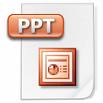
POWERPOINT on the MEANING OF PASSOVER
Take it, share it, its yours.
YOUTube VIDEO on the MEANING OF PASSOVER - Pt. 1
YOUTube VIDEO on the MEANING OF PASSOVER - Pt. 2

A study by Gavin Finley MD
endtimepilgrim.org - 2003
INTRODUCTION
TO THE 7 FEASTS
OF ISRAELTHE SPRING FEASTS 1. THE PASSOVER 2. THE FEAST OF
UNLEAVENED
BREAD3. THE FEAST OF
FIRSTFRUITSTHE SUMMER FEAST 4. THE FEAST OF
PENTECOSTTHE FALL FEASTS OF ISRAEL 5. THE FEAST OF
TRUMPETS6. THE DAY OF
ATONEMENT7. THE FEAST OF
TABERNACLES
#2 THE FEAST OF UNLEAVENED BREAD
There are two scripture passages in which the Feast of Unleavened Bread is described.
ESTABLISHED BY YHVH-GOD AT SINAI.
They can be found in Exodus 12 and in Leviticus 23.Leviticus 23 (NKJV [& GWF])
The Feasts of the LORD
1 And the LORD [YHVH] spoke to Moses, saying,
2 “Speak to the children of Israel, and say to them:
‘The feasts of the LORD, which you shall proclaim to be holy convocations,
these are My feasts.The SabbathThe Holy Scriptures stipulate the duration of the Feast of Unleavened Bread. It is to last seven days.3 'Six days shall work be done,
but the seventh day is a Sabbath of solemn rest, a holy convocation.
You shall do no work on it; it is the Sabbath of the LORD in all your dwellings.The Passover and the Feast of Unleavened Bread
4 'These are the feasts of the LORD,
holy convocations which you shall proclaim at their appointed times.
5 On the fourteenth day of the first month at twilight is the LORD’s Passover.6 And on the fifteenth day of the same month
is the Feast of Unleavened Bread to the LORD;
seven days you must eat unleavened bread.
7 On the first day you shall have a holy convocation;
you shall do no customary work on it.
8 But you shall offer an offering made by fire to the LORD for seven days.
The seventh day shall be a holy convocation;
you shall do no customary work on it.'"THE MEANING OF THE "HIGH DAYS" IN THE FESTIVE SEASONS
The first day of the Feast of Unleavened Bread, (decreed in Leviticus 23 as Nisan 15), is a "high" day, a "holy convocation" or a "holy day", from which we get our word "holiday". This first day of Unleavened Bread is a "Sabbath". And so also is the seventh day of the Feast of Unleavened Bread, (which is the 21st of Nisan). A Sabbath, whether it be a high holy consecrated Sabbath or the regular weekly (Saturday) Sabbath is a day in which no customary servile work was to be done. The Sabbath is to be a day consecrated to God. It is a time set aside for fellowship with Him. In the case of the high holy Sabbath days it is a time to gather with others to celebrate who Yehovah-God is, to remember what He has already done in times past on that particular Hebrew calendar day, and then to consider prophetically the things the Holy One of Israel has said that He He will do in times to come on that same Hebrew calendar day.
THESE "HOLY DAYS" ARE NON-SATURDAY SABBATHS.The Light of Israel is shining among the heathen and out to the ends of the earth. And the God of Israel, as always, is up front with those who truly seek Him. And He is easy to deal with. His yoke is easy and His burden light. His words are "yea, yes", and "Amen, "so be it!" So the Seven Feasts of Israel are seven waypoints on a spiritual map, not only to things past, as we see in the Spring Feasts, but also things future, as we see in the Fall Feasts.
These are special days when Old Covenant and New Covenant issues come into harmony. They are also a road map and a chart for Pilgrims on their way home. The Feasts of the Lord are seven waypoints in YHVH-God's cosmic agenda for the redemption, the Holy Spirit equipping, and the eventual perfection and glorification of all His covenant people at the climax of the age. His "ekklesia", His called our Congregation, are to become a single redeemed reunited undivided restored Elect. 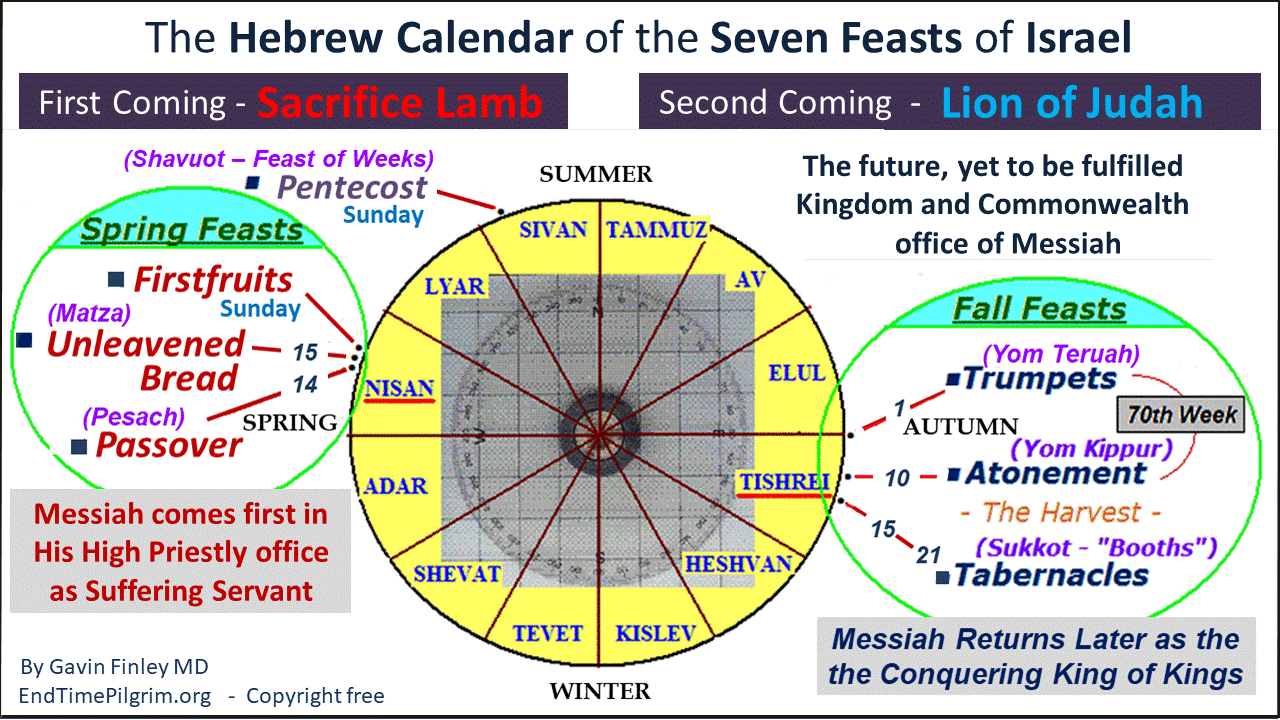
So this matter of the Sabbaths is not an onerous matter at all but a joy. It is a day in which we fellowship and celebrate with YHVH-God. The Sabbaths were instituted by God as a time of relaxation and fellowship with Him. It is a time to pause from our work, recharge our batteries, and strengthen our faith in the Shepherd of Israel who leads His people on. God likes to camp out with His people and talk with them and receive the praises and the worship that are due to His working in our lives. And what did YHVH-God, the sinless unleavened Bread of Heaven, say about the Sabbath when He came down as Yeshua Hamashiachinto into this leavened cosmos to dwell among us? He said,
"The Sabbath is for man. And not man for the Sabbath.Dear saints, the Sabbath is a gift from God.
Therefore the Son of man is also Lord of the Sabbath." (Mark 2:27)
He personally set forth all the Sabbaths for our good.THE FEAST OF UNLEAVENED BREAD
The first day of Unleavened Bread is the night following the twilight and the sunset of Passover and the following day until sunset. This Sabbath day or "high" day, the night and day after the Passover lambs are killed is day #1 of the Feast of Unleavened Bread. Being a Sabbath it is a time set aside for sacred assembly, a holy convocation or a high holy day, a rest day devoted to the Holy One of Israel. The seventh day and the last day of the week long feast is also a Sabbath.
AND A HEBREW CALENDAR FOR THE PASSION YEARBelow is a calendar of the spring feasts as they occurred during the passion year.
The calendar is based upon these well established Biblical facts.1. Passover as we see from Leviticus 23 above, always comes on the 14th day of Nisan.
2. The resurrection of Messiah in passion week came on the the first day of the week, a Sunday. See these Scripture passages.
3. The Resurrection of Messiah is Biblically connected to Firstfruits in its timing and in its spirit. Messiah rose from the grave right on this feast day. In His rising He Himself became the firstfruits from the dead Thus He fulfilled the Feast of Firstfruits in the New Covenant. See 1Cor. 15:20-23
4. Jesus/Yeshua was three days and three nights in the grave.
See this scripture Matthew 12:40. 5. Yeshua/Jesus was Israel's Sacrifice Lamb and He was crucified on Passover, Nisan 14. He was laid in the tomb just before the sunset of that Nisan 14 which marks the beginning of Nisan 15, the High Day, the Sabbath that marks the first day of Unleavened Bread. So from this sunset we count out three days and three nights which takes us to sunset of Saturday night. At that time He was resurrected from the dead just as the first day of the week began on that morrow after the 7th Sabbath of Passover6. If Nisan 14 was the Resurrection Day, Then we count out Nisan 15, Nisan 16, and Nisan 17 as days, 1,2,and 3 in the grave, Sunset of Nisan 17 beginning on Nisan 18 would be the time of the Resurrection and began the Resurrection Sunday which was on the Feast of Firstfruits a Sunday.
7. If Nisan 18 was the Resurrection Day, the Feast of Firstfruits, and a Sunday then going back through those three days from sunset Nisan 17 Saturday night we come to sunset of the Nisan 14 which would have made Passover, the day of the crucifixion, a Wednesday. Nisan 15 was by definition the first day of Unleavened Bread. It too was a Sabbath, a high holy day of convocation. (See Lev. 23:6-7).
Thus we have both Nisan 15 and Nisan 17 as Sabbaths during Passover Week in the passion year.
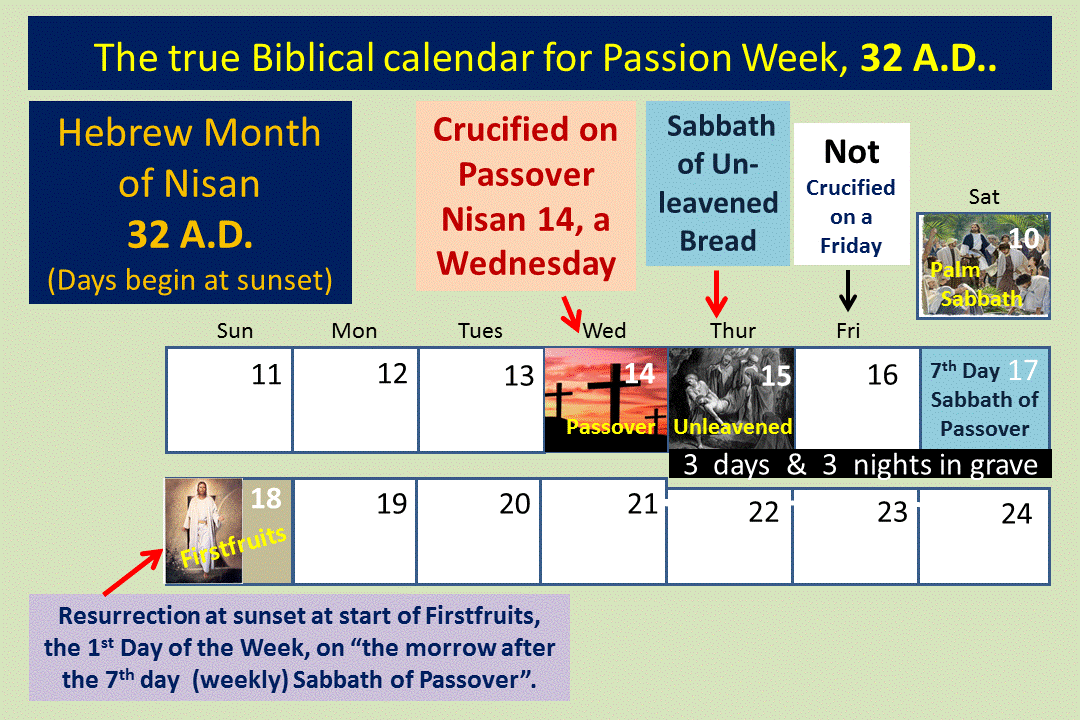
The calendar shows the Feast of Firstfruits is the day immediately following the weekly (Saturday) sabbath in those days that follows Passover. It is always the first day of the week, a Sunday, a work day. Firstfruits is also the first day of the barley harvest and on this day the omer, the firstfruits of the barley harvest, are waived before the Lord. Firstfruits is also day#1 for "counting the fifty days of the omer".
The seven days of the Feast of Unleavened Bread run from Nisan 15 to Nisan 22. The first and seventh are Sabbaths or High Days. The Leviticus 23 passage above clearly stated that the first and the seventh days of this feast were to be holy convocations in which not regular servile work was to be done. These two days of the feast were to be high holy days, rest days, or Sabbaths. Just like the regular weekly Sabbath these Sabbaths were to be days of rest from labor consecrated in the devotion to the Yehovah-God Almighty.
Note also that as Jesus was in the belly of the great fish/whale for three days and three nights so was Jesus to be three days and three nights in the grave. So between the sunset of Passover on Nisan 14 that marks the beginning of Unleavened Bread, Nisan 15 we have a 72 hour time space before we get to and the sunset of the weekly 7th day Sabbath that marks the beginning of Firstfruits, Resurrection Day. So counting back 72 hours from the sunset that marked the beginning of Firstfruits we come to a Passover, Nisan 14 that in the Passion year must have been a Wednesday. This was the day when the sacrifice lambs were killed and the day of the crucifixion.
As we noted above, Firstruits is the first day of the barley harvest. It is our anchor day, day#1 for counting the out the fifty days of the omer. (See the numbers 1-50 marked in red). We start counting the days at Firstfruits which is day #1 and then 49 days later comes Day#50 and we have arrived at the summer feast, the Feast of Pentecost. This is another day of wonder and celebration in God. Pentecost is the birthday of the nation of Israel and also the birthday of Israel's wider Congregation, the Congregation of Israel, the Church. Together they make up the Commonwealth of Israel
The New Covenant fulfillment of the Feast of Unleavened Bread was seen in the Passover of Christ's passion. Jesus/Yeshua was buried in the earth during in the fading daylight of Passover on the 14th of Nisan just as Nisan 15 Unleavened Bread was to begin. He was hastily put in the tomb just before sunset just in time before the beginning of the Sabbath. This was not not the weekly Sabbath, but the Sabbath of the first day of the Feast of Unleavened Bread. This is an important fact to remember. Because this matter of the two Sabbaths of Passover is where the confusion has arisen. Our church tradition was set forth back in the Byzantine era in times past. And in labeling so called "Good Friday" as the day of the crucifixion on the day before the wrong Sabbath our traditions are clearly in error and off the mark.
FIRSTFRUITS AS A SUNDAY, THE 1ST DAY OF THE WEEK
Firstfruits, as we have seen is an important Feast day. It comes in the week that follows on from Passover, (Nisan 14), the Sabbath of the first day of Unleavened Bread, (Nisan 15), and on to the sunset beginning of the day immediately following the seventh day weekly, (Saturday), Sabbath of Passover. So Firstfruits is always on the first day of the week, a Sunday. This reckoning of Firstfruits as following the weekly Sabbath and not the High Day Sabbath of Unleavened Bread was affirmed by the Sadducees. And they were correct. Because this was confirmed by Jesus in His fulfillment of those first three Spring Feasts.
AND HOW THIS AFFECTS THE COUNTING OF THE OMER, (50 DAYS)
RIGHT THROUGH TO PENTECOST SUNDAY, 1st DAY OF THE WEEK.Firstfruits Resurrection Sunday is followed by the Feast of Pentecost 49 days later on day 50. This is the counting of the omer. So both Firstfruits and Pentecost come on Sundays. These are the two Feast days that do not come attached to any specific date on the Hebrew calendar. Firstfruits is the first day of the week following Passover. It is day #1 of the fifty days leading up to day #50, the Feast of Pentecost. See the following graphic showing the correct way of counting of the omer. This also happens to also be the way the omer should be counted according to the Sadducees. In this controversy it turned out that the Sadducees were right and the Pharisees were wrong. More on this shortly.
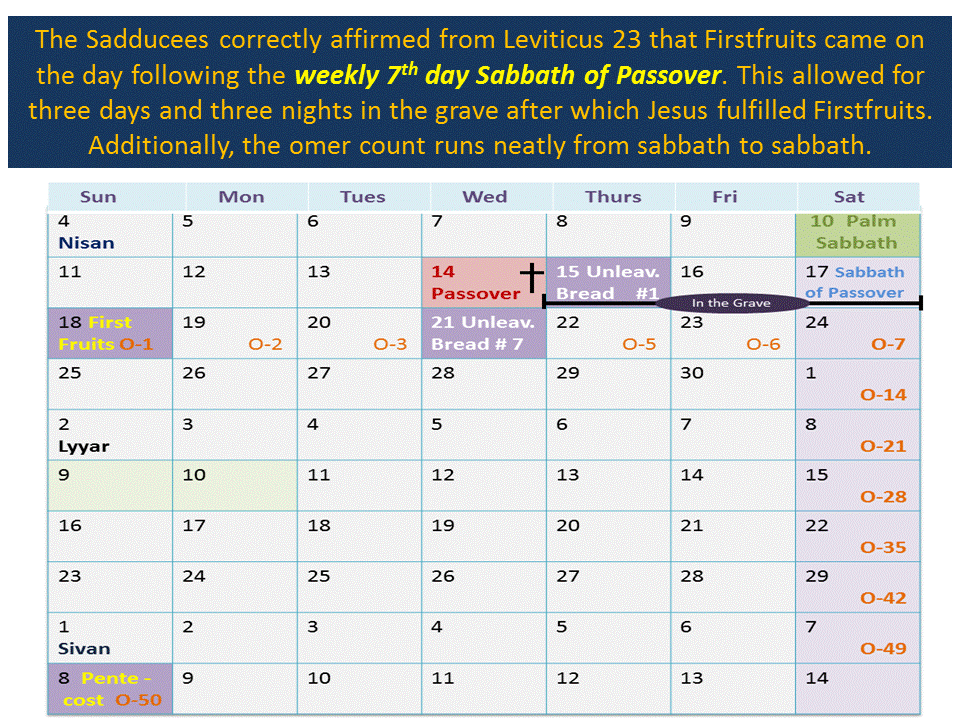
So Firstfruits and Pentecost are alike in that they are not tagged to a specific date on the Hebrew calendar. The two feasts mark the beginning and end of the fifty days of the barley harvest. Just as the barley harvest ends the wheat harvest begins at Pentecost. So as we look at our calendar and that square block of seven weeks of seven days and count out the omer to one day beyond day #49 and get to day#50 we notice that they are laying out seven Sabbaths. And as we have shared. Both the Feast of Firstfruits, (day#1) and the Feast of Pentecost, (day #50), occur on the same day of the week.
They both come on a Sunday.The Pharisees held a contrary view. They held the view that the counting of the omer began from Firstfruits but their Firstfruits day was reckoned by them as being the day following the Nisan 15 First Day of Unleavened Bread or Nisan 16. They considered that Firstfruits should be celebrated on the day after Unleavened Bread Sabbath and not the day following the weekly 7th day Sabbath of Passover. But as we see in the graphic below this was not confirmed by Jesus at all. Because as He fulfilled Unleavened Bread going into the grave on the eve of Unleavened Bread He was in the grave a full three days and three nights. But the morrow after that first day of Unleavened Bread only allows an elapsed time of 24 hours. Clearly He would not have been able to fulfill the Feast of Firstfruits if it was reckoned to be just 24 hours after He was laid in the grave. So in short, there is no way to accommodate those three days or 72 hours in the 24 hour hours between the beginning of Unleavened Bread and the beginning of a Firstfruits tagged as Nisan 16 on the morrow after the Sabbath of the First Day of Unleavened Bread. See the graphic below.
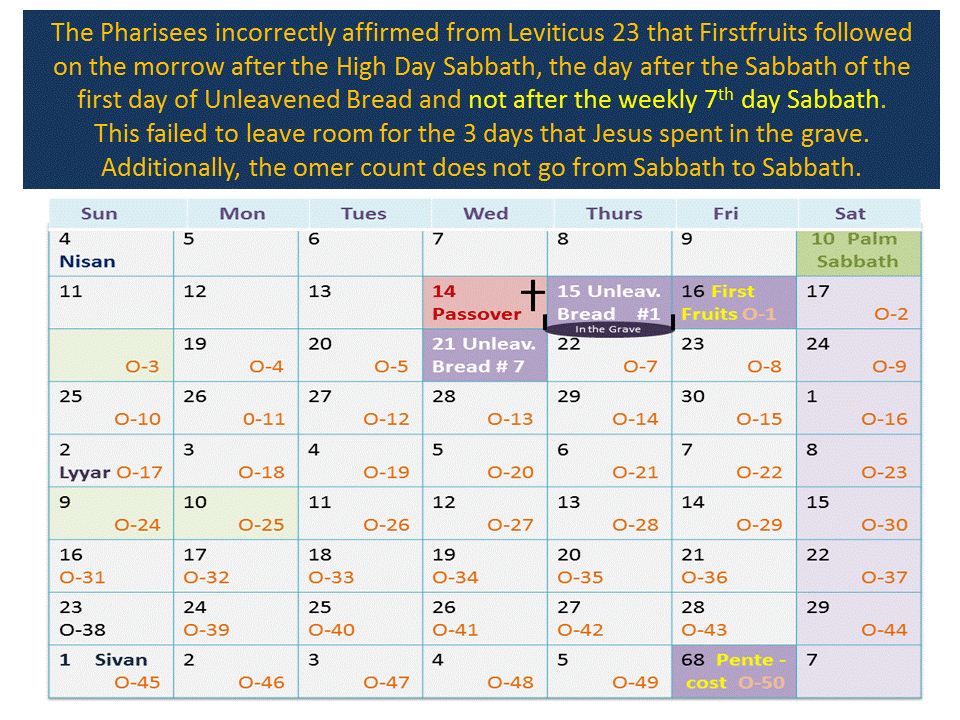
THE SYMBOL OF LEAVEN AS WICKEDNESS.
Leaven in the scriptures symbolizes sin.
From the Christian perspective, the picture is quite clear.
Jesus was the unleavened sinless Bread of Heaven.
His life was one of sinless perfection.
And His body was offered up to YHVH/God.
He was the acceptable and perfect sacrifice for sin.The Feast of Unleavened Bread is also a calling to God's consecrated people.
They are exhorted to journey on with their Saviour in a walk of holiness.
In Christ we enter into a divine communion as we partake of the Unleavened Bread of God.
Through Him we let go of our selfism to enter into a new state of being.
We come into submission to YHVH/God in unpretentious sincerity and truth.
Here are the words of the Apostle Paul on the matter.
1 Corinthians 5When the Israelites left Egypt they left in haste. The bread they took with them was unleavened bread, baked in haste for a people who were on the move and preparing their victuals to travel. The Feast of Unleavened Bread commemorates the time when the Israelites left Egypt. Their next waypoint was the crossing at the Red Sea. They bread they took with them was not puffed up. It was baked without yeast. There simply was not time enough to allow the bread to rise.
7. Therefore purge out the old leaven,
that you may be a new lump,
since you truly are unleavened.
For indeed Christ, our Passover,
was sacrificed for us.
8. Therefore let us keep the feast,
not with old leaven,
nor with the leaven of malice and wickedness,
but with the unleavened bread of sincerity and truth.THE BREAD FROM HEAVEN
The Bread from Heaven was seen in the earlier history of Israel.
The God of Israel provided manna in the wilderness for forty years.
And the heavenly food of provision was spoken of by the prophets.
The Bread of Heaven is seen repeatedly in the poetry of the Old Covenant.But during the Passover of the Passion year YHVH-God personally demonstrated something more.
He defeated the gnostic powers, the trolls that block the Way between heaven and earth.How did He do this?
The answer is quite simple.The sinless Bread of Heaven was put in the grave.
But His body did not see decay of corruption.
He brought His heavenly perfection into this sinful world.
And by His incorruptible Life He defeated the powers of darkness.And here is the Good News.
He brought salvation to sinful men.
Nehemiah 9:15 NKJVThe typology of Christ as the Bread of Heaven is in the Holy Scriptures.
"You gave them bread from heaven for their hunger,
And brought them water out of the rock for their thirst,
And told them to go in to possess the land
Which You had sworn to give them."Psalm 78:24
"... had rained down manna on them to eat,
And given them of the bread of heaven."Psalm 105:40
"The people asked, and He brought quail,
And satisfied them with the bread of heaven."
It is taught in the New Testament and in the very words of Jesus Himself.
Jesus Himself said that He was the "Bread sent from Heaven".
John 6:33 NKJV
"For the bread of God is He who comes down from heaven
and gives life to the world."John 6:50
"This is the bread which comes down from heaven,
that one may eat of it and not die."John 6:51
I am the living bread which came down from heaven.
If anyone eats of this bread, he will live forever;
and the bread that I shall give is My flesh,
which I shall give for the life of the world."
Jesus was the final and perfect sacrifice for sin.
He was the Suffering Servant spoken of by the prophet Isaiah.
(See
Isaiah 53.
His body, sinless, the unleavened Bread of Heaven,
broken and humbled on the cross, was offered for our redemption.
He was buried just before sunset on the eve of the Feast of Unleavened Bread.
He was in the grave just in time for the 15th of Nisan.
And so it was that Jesus Christ/Yeshua Hamashiach
fulfilled the Feast of Unleavened Bread according to the scriptures.
|
|

|
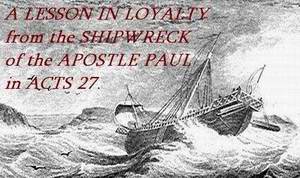
|
|
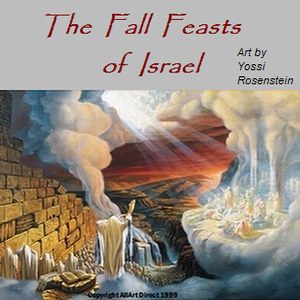
|
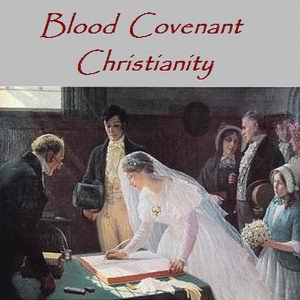
|

|